Photographs: Courtesy Careers360 Urmila Rao
When Karnataka health minister SA Ramdas raided the offices of YGen Management Consulting Private Ltd, on a series of complaints against it and its partner Karnataka Open University (KSOU), little did he have an idea that he was opening a Pandora's box, which would affect lakhs of students.
His own quest led to another university, Gulbarga, which hastily 'suspended' its tie-up with YGen Management Consulting.
Gulbarga's registrar Hiremath clarified, "There was some problem with the outreach centres and the university was having second thoughts about running the programmes." (Deccan Herald, May 8, 2012).
The newspaper further quotes him, "Only provisional admission was made by the agencies and the university neither admitted any student nor collected any fee from them".
Hiremath was obviously referring to more than 2000 students enrolled by YGen through its 'outreach centres' to be offered Gulbarga University degree. As we go to press, the fate of these 2000 students hangs in the balance.
But the malice is widespread. Such arrangements get a facade of credibility from state universities like the KSOU, Gulbarga Univeristy, Manonanmaniam Sundaranar University, Bharathiar University and several others, offering their degrees.
They confer 'validity' to unrecognised, unapproved private/public, for-profit institutions, that violate norms on every count with impunity.
Worst of all, the entire method of functioning maybe illegal and degrees thus offered to students may not be legitimate.
Please click NEXT to continue reading...
How does the model work?
Let's take the Gulbarga-YGen tie-up as an example.
Gulbarga appoints YGen Management Consulting Pvt Ltd as the exclusive partner for offering its outreach programmes.
YGen then goes on to appoint a host of outreach centres/institutions all over the country. These outreach centres are institutions without requisite regulatory approvals.
These providers charge hefty fees from students and flout norms. The disdain for law is such that some of these institutions are registered under the 'Shops and Establishments Act'.
These centres, further proceed to advertise that they offer legitimate degrees, as approved outreach centres for Gulbarga University.
They will also offer their own programme -- a PGP or a PGD, a laptop, a foreign jaunt etc. to justify the high fees they would charge. The fee, in some instances, is five to twenty times the cost of a distance learning degree, which a student pays in comparison to what he would pay under direct enrolment to a university.
The hapless student assumes that s/he is getting a full-time university degree.
Watch out for these institutes
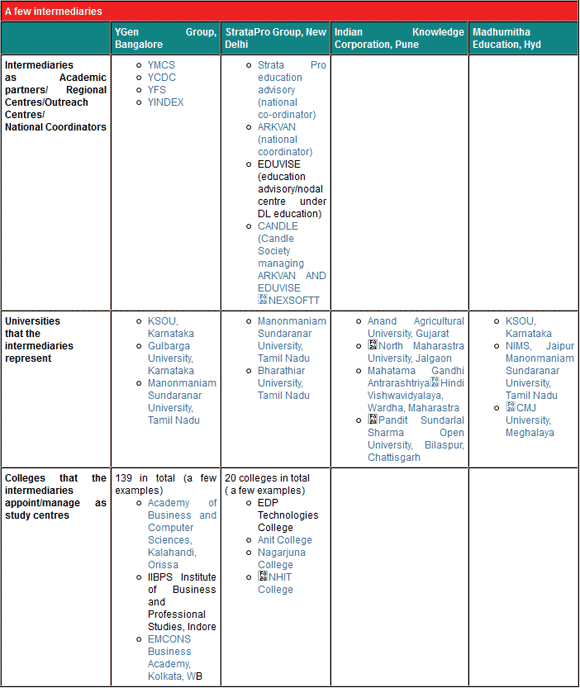
Where does the law stand?
Is the entire modus operandi within the legal ambit? The answer is 'No'.
Such tie-ups violate the law of the land under four major heads.
Franchising and profiteering
The Supreme Court, as well the government has banned franchising of higher education institutions. UGC, AICTE and Distance Education Council (DEC) have come up with notifications to this effect reiterating the same.
Since the university appoints a central co-ordinator, which subsequently selects/ appoints/manages its local centres, the arrangement is distinctly franchising and is patently illegal.
Besides, in India, education (offering legitimate qualifications) cannot be 'for- profit' as of now while most franchisees are 'for- profit' organisations.
Territorial Jurisdiction
The Supreme Court in the Prof Yashpal & Anr versus Govt. of Chattisgarh & Ors clearly stipulates that State Universities cannot have jurisdiction beyond their respective states.
The applicability of this ruling for open universities is reaffirmed by the Madhya Pradesh High Court in the Canam Technologies Vs. Government of India Ors 2007 case, where the court adjudged that "Mode of Distance Education system may be practiced by way of telecast, broadcast and correspondence courses" but that does not mean a regional centre or a study centre can be established beyond the territorial jurisdiction of the State as the Act extends only to whole of Madhya Pradesh.
Section 3 provides that the headquarters of the university shall be at Bhopal or it may establish or maintain regional centres and study centres at such places as it may deem fit, but such places have to have the nexus and the connection with the provision of the Statute in as much as it cannot go beyond the territorial limits of the State of Madhya Pradesh".
Subsequent to that, UGC has come up with a series of notifications banning such centres.
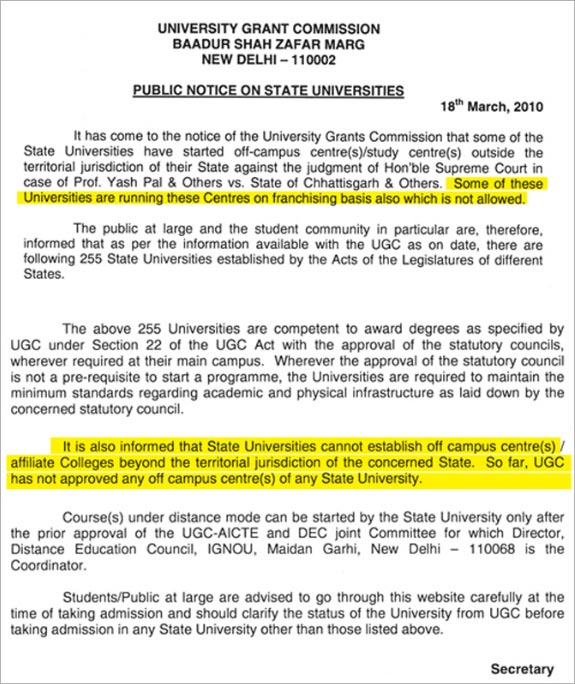
The cause for confusion is the stand of DEC, which states that the off campus study centres are subject to the statues of the respective university.
But even that DEC administrative order will not be applicable to professional courses like MBA which would need the approval of AICTE or the Joint committee of AICETE-UGC-DEC in case of distance learning.
Moreover, the DEC approval norms very clearly state that franchising in any form is not allowed at all.
Institutions operating beyond the purview of law
Mixing of Distance Learning and regular streams
Because Distance Learning (DL) degrees have only limited traction, some universities like Bharathiar and Manormaniam Sundaranar and even IGNOU have invented names like Centre for Online and Participatory programmes (CPOP), Offsite Academic partnerships (OAP), Convergence Scheme etc to expand their offerings.
Programmes offered under these schemes claim that students are taught in 'weekend regular' or 'online regular' or 'face to face' mode. This misleads the students into believing that they are pursuing regular programmes.
This is obfuscation at its worst. A university can offer regular programmes only under its constituent colleges/departments or under its affiliated colleges. Anything else is not regular and claiming otherwise is illegal.
Other regulatory approvals
Most professional degrees like MBA, BE, B.Tech, Paramedical courses, Nursing, Rehabilitation etc. require approvals from their respective professional councils or/and the All India Council of Technical Education (AICTE).
None of these centres have such approvals and hence their professional degree offerings, despite coming from an approved university may become invalid.
AICTE has already taken a view that no institution other than a university can start any technical programme in any mode without its express approval.
Ineffective monitoring
UGC is content with putting up notices proclaiming that such centres are illegal. States like Haryana, have valiantly come up with notifications, warning students about fake and dubious institutions. AICTE maintains a list of unapproved institutions/programmes.
But none of them speak a word about these institutions which operate beyond the purview of law. And when one of them gets raided and closed like in the case of YGen, they re-appear in a new avatar.
Above the law?
Though the law is clear that education cannot be for-profit, the intermediaries that the universities tie-up with go under agreeable titles such as, academic partners/nodal centres/participatory institutions/outreach centres etc.
In effect, these partners (who work as intermediaries) are master franchisees of the universities. They subsequently sub franchise, that go by the name of study centres. All the intermediaries appear to be private limited companies.
UGC is aware of the malpractice and issues a public notice on its website.
"It has come to the notice of the University Grants Commission that some of the State Private Universities have affiliated colleges and started off-campus centre(s) in violation of the UGC (Establishment of and Maintenance of Standards in Private Universities)...Some of these Universities are running these Centres on franchising basis also which is not allowed." (Source: http://www.ugc.ac.in/privatuniversity.aspx).
YGen: A case in point
YGen Management Consulting was a known and early player in this domain.
In May 2010, Careers360 did a story on how such tie-ups violate the letter and spirit of the law.
But two years on, little has changed. While the UGC and other regulatory bodies sleep, students continue to trust their careers and lives with institutions that dispense, in all probability, invalid degrees despite no lessons seem to have been learned.
If YGen's websites are to be believed, it has come back dramatically.
As you can see from the graphic, while YGen management services says 'We will come back soon', all the partner universities as well as the institutions have moved to a new company 'YGen Consulting Development Centre', another group company of YGen.
Bogus approvals and tie-ups lure students
Another education services company at New Delhi, StrataPro Education Advisory, too functions unquestioned.
It has several identities such as CANDLE, EDUVISE, ARKVAN and NEXSOFTT.
StrataPro is the academic partner of Bharathiar University and MS University ( Manonmaniam Sundaranar University). MS University also employs franchisees/co-ordinators in other states.
For instance, in Punjab, the alliance is with Shri Sai Institute and in Gujarat, it is with Karnavati Education.
Careers360 tried to get in touch with all the players involved but barring one, no one responded. We sent an e-mail and a fax to the Chancellors of the Universities mentioned, i.e Governors of Karnataka and Tamil Nadu but did not get any response.
Dr SK Singh, Vice Chancellor, MP Bhoj Open University, Bhopal says private players open a shop, keep a fancy name and seek an MoU with a university.
"They try to influence the VC, the office bearers of the university to recommend their case," he adds.
The regulatory quagmire
DL degrees, especially the professional ones like, MBA and MCA can be offered in distance mode by those universities which have got the approval of joint committee of UGC-AICTE-DCE.
PTU has the committee's approval but IIBS, a Noida-based institute, which offers PTU's DL degree, also offers Bharathiyar's regular degree. It is obvious IIBS is not a study centre owned by PTU.
Similarly, PTU has collaborated with NRAI School of Mass Communication, Gautam Nagar, Delhi, to offer Bachelor's in Mass Communication. One of the students' of NRAI shares, "The course material was not even of PTU."
Take the case of another university, EIILM( Eastern Institute for Integrated Learning in Management ). EIILM has joint committee's approval to offer distance learning, only of three programmes to be offered in DL mode.
But what is not disclosed to students is this: EIILM had DEC's regular approval till year 2010 only and that too only for three programmes while more than 50+ degrees in fashion, paramedical, engineering and even MPhil programmes are being offered on behalf of EIILM (based on EIILM and DEC websites).
This approval is fully used as a bait to hook students by SARF (Social Action and Research Foundation ) who claims to be its national coordinator.
Illustration: Dominic Xavier
The intermediary pitch
Photographs: Rediff Archives
Careers360 spoke to Ambrish from Madhumitha education. Excerpts from the conversation:
Do you offer regular degrees or distance learning degrees?
Both, Madam
You also have tie-ups with the NIMS, MSU and EIILM. They have appointed you as the national coordinator. Is that true?
Some of them as study centres and some as co-ordinators
For EIILM also, you run many courses. Is that true?
Yes, Ma'm
These are regular degrees of EIILM?
Yes Madam.
Are the regional centres legal?
Yes
Are the NIMS and MSU also approved?
Yes, madam, they have approval. They have DEC joint committee approval. KSOU has DEC (Distance Education Council) approval and CMJ has regular mode but UGC approved.
So students take admission to the respective colleges you have like the Vaishnavi and Anit?
Vaishnavi College is affiliated to EIILM University and other universities. If the student gets admission in the EILLM, then directly the admission will be from Vaishnavi. If he is admitted in the NIMS University, then the student will become a Madhumita education student.
Suppose, in Anit college, a student takes admission, so will he get a degree from KSOU or NIMS?
If a student has taken admission in KSOU, then he will take admission from that particular regional centre. If one takes admission in NMIS, if Anit is not approved from the NMIS, then he will be a Madhumita education student. Whichever centre the university allots, the student will go to the centre that who claims to be its national co-ordinator.
Too heavy a price?
The colleges charge steep fee from students in almost all the cases.
In the case of Punjab Technical University (PTU), Jalandhar, the fee is three times more than what one would pay if one pursues the course directly.
The International Institute of Business Studies (IIBS) Noida , for instance, charges Rs 2.95 lakh per student for DL (distance learning) MBA degree. Whereas a regular MBA from PTU is for Rs 60,000 per annum or Rs 1.2 lakhs for two years!
Interestingly, the degree that is handed out by IIBS, Noida doesn't bear a PTU centre code, (or name of the programme-giver, IIBS) anywhere. IIBS also offers Bharathiyar University (BU)'s regular MBA degree at Rs. 3.95 lakhs.
Another institute, IBMR, a b-school from Gurgaon, which offers a regular MBA degree too, pegs it a lakh more i.e. Rs 5 lakhs.
Where does the entire fee go?
What is not clear is how a student's Rs 5 lakh fee, for a Rs. 60,000 course, gets sucked up in the system.
When a student pays Rs. 5 lakh for an MBA degree, he issues the demand draft on the name of the institute (and not the university).
In all probability the institute pays, the university fee, (varies between Rs, 30,000 to 60,000) as a demand draft on behalf of the student. It would also pay a certain sum to the intermediary (YGen, StataPro, IKC etc).
Dr SK Singh of M.P. Bhoj Open University says that the objective of private players who have opened shops for sale of degrees in the market have only one agenda -- just to make money.
There are instances where institutions charged as much as Rs. 10 lakhs as fees while the university received as little as Rs 40,000 as legitimate fees.
And all these fees are routed through the private institute. Further, these universities enable such fleecing of students. They do not declare the total fee and let the institute demand and receive whatever they please.
Why would a state university flout norms, and accept payment from the private player with such impunity? What is the quid pro quo? Is there more to it than what meets the eye?
How is the rest of the money, which amounts to 85 per cent of the fees paid by the student at times distributed?
Illustration: Uttam Ghosh
The institute's pitch
Urmila Rao, Special Correspondent, Careers360 met with Ranjay, Director at IIBS, Noida posing as a student.
Excerpts of the conversation are reproduced below:
Which university will I get a degree from?
In the Noida campus, we'll give you a degree from two universities: the PTU (falls under the DEC) and Bharathiar University.
Do you conduct regular degree courses too?
Yes, and classes are regular (9 am to 5 pm) for both universities, but the PTU falls under the DEC and we are the partner institute for the Bharathiar university. But you need not worry because none of this information will be mentioned in your certificate (whether the degree is through distance or regular mode)
What is the difference between the PTU and Bharathiar?
Nothing. There is no difference, the same faculty will teach you at both the places. We are providing same facilities to Bharathiar and PTU. No difference at all.
If Bharathiar collaborates with a company, PTU follows suit. The only difference, however, would be in the fee structure. While Bharathiar is slightly expensive, PTU charges lesser.
What is the fee to join Bharathiar?
The total cost will work up to Rs 3.95 lakhs.
After I pay the registration fee, will you give me a receipt? Will this fee be credited in your name or the university's?
The fee will be mine
Do we pay nothing to the university then?
No, you will pay nothing , we will pay the fees to the university.
I have scored only 49 per cent in graduation. Is that enough?
Yeah, OK.
Is there a need to seek approval from the DEC?
Only distance course required DEC approval. And this is not a distance programme.
Questions that need answers
Photographs: Rediff Archives
- Why are the regulators in a 'conspiracy of silence' with the actors allowing to break all laws with impunity and disdain, at the cost of students' lives and country's future?
- Why are the powerful organisations quiet on this? Why are they making vague rules and administrative orders while the game is being played at the cost of students, parents and the country.
- Why can't the AICTE initiate suo moto action against these players and direct the respective state governments to initiate police action and shut them down?
- Why can't the UGC de-recognise all the state universities for breaching the law of the land?
- Why can't the DEC withdraw approval for those institutions which violate its norms and standards?
- When will the authorities finally wake up and act?

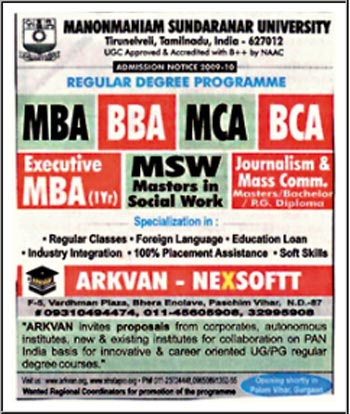
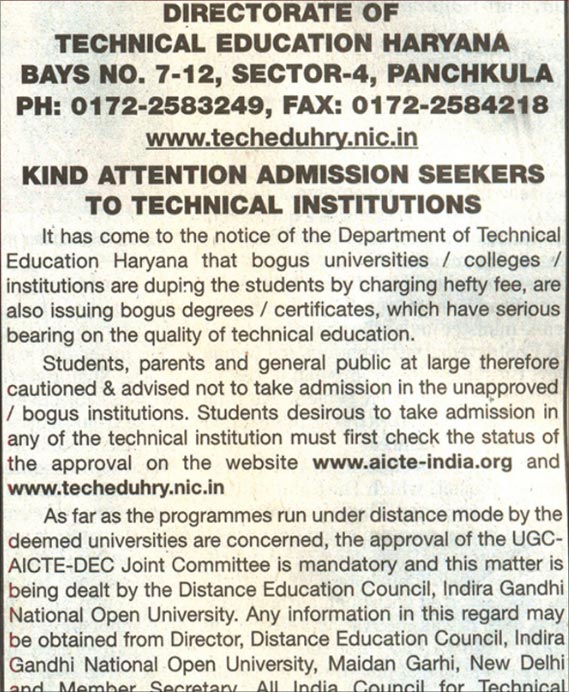
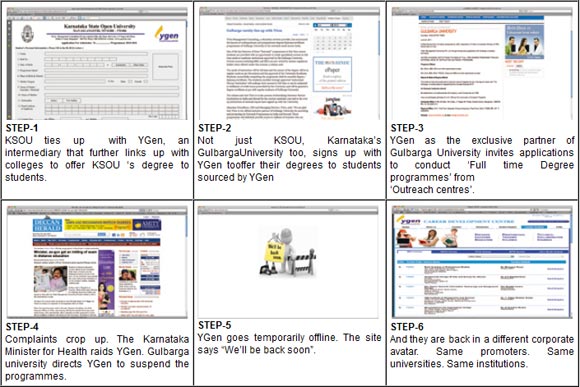





Comment
article